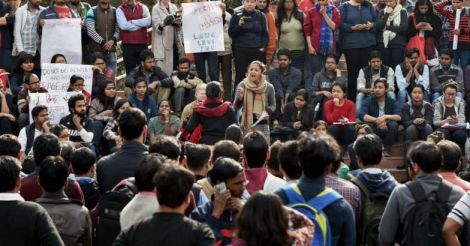Students protesting on the JNU campus against the hanging of Parliament attack convict Afzal Guru might perhaps have crossed a limit, but by raiding a campus known for its freethinking and robust political discourse, the central government has perhaps crossed all the limits of action in a democracy. In fact, the events bring to mind the fearsome days of the Emergency which some in the ruling BJP themselves had opposed.
JNU students' president Kanhaiya Kumar and former DU lecturer SAR Geelani are behind the bars with sedition charges slapped against them. But Delhi Police Commissioner B.S. Bassi has categorically said there was no proof that anti-national slogans were raised at the event.
The students may have erred or not – the case is still being heard – but home minister Rajnath Singh's hurried intervention and the events that followed betray the anti-democratic tendencies of the ruling dispensation. It is these tendencies of a right-wing government, long feared and sneaking into public view ever so often now, that is a cause of worry to all Indians.
Also read: Bassi justifies Kumar's arrest, no evidence of LeT link so far
The alacrity with which Delhi police responded to complaints about the protests, the attack on students outside a Delhi court by lawyers, and attack on protesters including journalists, all speak of a regime that brooks no dissent.
Also read: Scuffle breaks out between JNU students, lawyers in court campus
Against this backdrop, the Dehi high court's refusal to let the National Investigation Agency probe the case is a welcome relief in the climate of fear and a signal to the government that it has overplayed its hand.Read: No NIA probe in JNU sedition case.
If indeed anti-national statements were made, the government is justified in taking action against the students. Even then shouldn't it have done it with prudence? Surely, these are only students, not arms-wielding terrorists.
The Centre should have at least waited till an investigation report before sending its police personnel into the premier institution for arresting the students.
The institution, known for its leftist discourse, has in recent years turned into a battleground in the fight between leftist and rightist political thought. And the protest itself could have been a small eddy in that larger swirling of idealogical streams. By muscling its way into it, the government helped blow it into such proportions that even the international community is now keenly watching the developments.
When international media call the JNU a 'battlefield', can we really blame them?
The world is watching, we cannot say 'Come, Make in India', when the freethinking of our own young people are being suppressed.
























 File photo of JNU students protesting
File photo of JNU students protesting
Disclaimer
The comments posted here/below/in the given space are not on behalf of Manorama. The person posting the comment will be in sole ownership of its responsibility. According to the central government's IT rules, obscene or offensive statement made against a person, religion, community or nation is a punishable offense, and legal action would be taken against people who indulge in such activities.